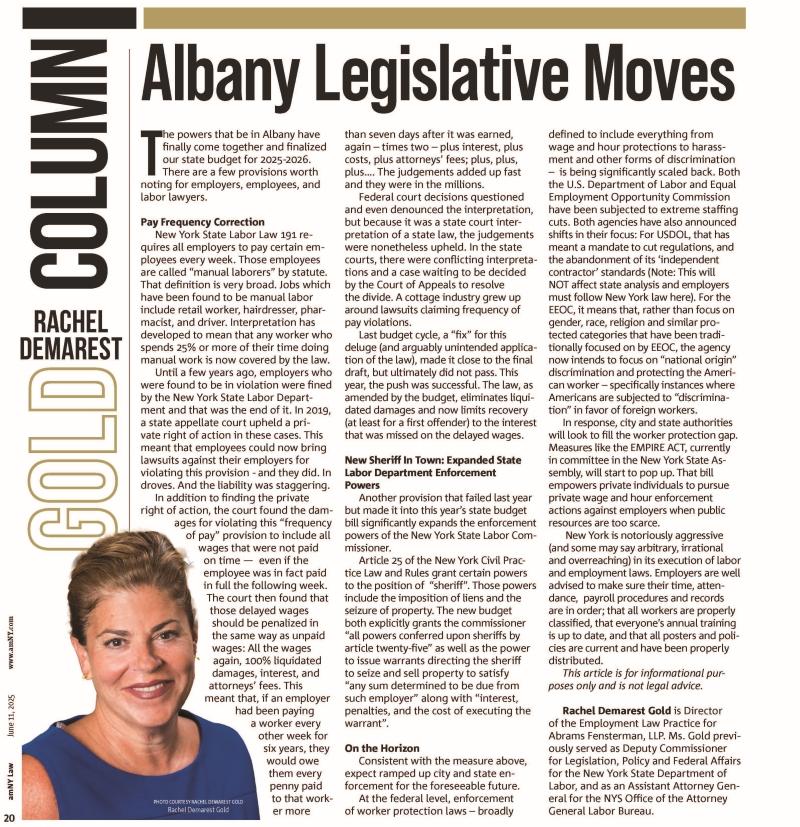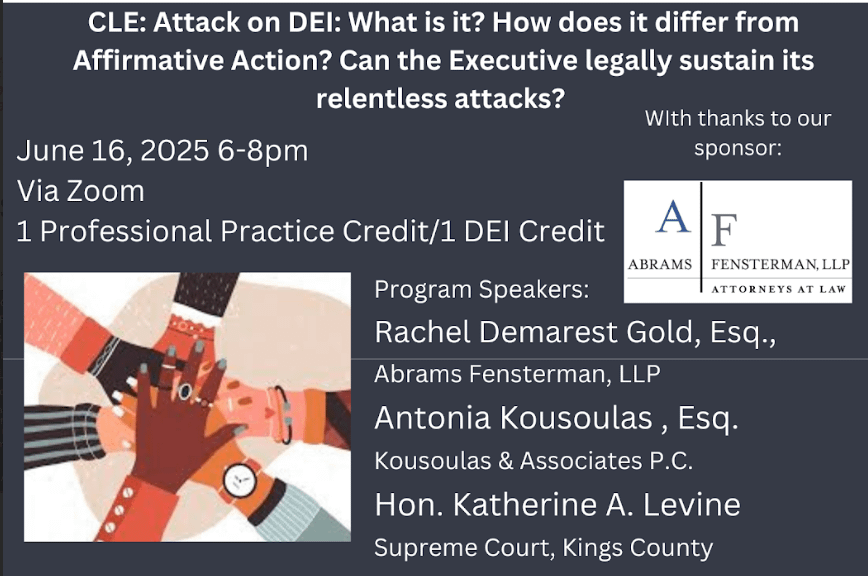By Justin Kelton
This article discusses the Court of Appeals’ recent decision in Doe v. Bloomberg, L.P., —N.E.3d—, 2021 WL 496608 (Feb. 11, 2021), in which the court grappled with whether an individual business owner qualifies as an “employer” under the New York City Human Rights Law (NYCHRL). The court’s decision created a sweeping new per se rule holding that individual owners do not qualify as “employers”—and, therefore, are exempt from the NYCHRL’s vicarious liability provisions—despite the expansive scope of the statute.
Plaintiff’s Sexual Harassment Claims, and the Underlying Procedural History.
The plaintiff in Doe was an employee at Bloomberg L.P. who alleged that her boss engaged in illegal discrimination, sexual harassment, and sexual abuse. She brought claims under the NYCHRL against the individual who allegedly harassed her, the company, and also Michael Bloomberg individually, based on his status as an owner and officer of the company. With respect to Mr. Bloomberg, the plaintiff alleged that he fostered an environment that accepted and encouraged “sexist and sexually-charged behavior.” Id. at *1. She did not claim that Mr. Bloomberg personally participated in any of the specific offending conduct. Id. Nevertheless, the plaintiff sought to hold Mr. Bloomberg individually liable based upon N.Y. Admin. Code § 8-107(13)(b)(1), which is “a vicarious liability provision which imposes strict liability on an employer … .” Id. at *2.
Mr. Bloomberg moved to dismiss the claims against him, and the Supreme Court initially granted the motion to dismiss, but later granted reargument and denied the motion. Id. at *1. Mr. Bloomberg appealed, and a divided panel of the Appellate Division, First Department, reversed the trial court’s decision, and dismissed the claims against him on the basis that the plaintiff had not alleged that Mr. Bloomberg “encouraged, condoned or approved of the specific discriminatory conduct.” Id. Because two Justices of the Appellate Division dissented, the plaintiff was permitted to appeal to the Court of Appeals as of right pursuant to CPLR § 5601(a).
The Court of Appeals Holds that Individual Business Owners and Officers Are Not Vicariously Liable as ‘Employers’ under the NYCHRL.
The Court of Appeals affirmed the Appellate Division’s dismissal of the NYCHRL claim against Mr. Bloomberg, albeit on different grounds.
The decision, written by Judge Garcia, began by recognizing that “the term ‘employer’ is undefined, generating confusion as courts have endeavored to determine who is an employer in the context of the extensive—and at times strict—liability imposed.” Id. at *2. The court noted that this issue had led to some confusion in the lower courts, and some courts had erroneously used the test for determining whether an employer is liable under the State Human Rights Law in seeking to decide who is an employer under the City Human Rights Law. Doe at *2-3.
Judge Garcia analogized the situation presented in Doe by referencing general principles concerning the protections afforded by business entities. For example, the court noted that although a corporation may be vicariously liable for the torts of its employees or agents at common law, individual directors and officers are not personally liable at common law simply by virtual of their offices. Id. at *5. Likewise, the court observed that “[s]hareholders are not commonly understood to be employers … ,” and that various laws governing business structures, including Partnership Law §§26, 121-303, Limited, Liability Company Law §609, and Business Corporation Law §719, generally support limitations on liability of partners, members, and directors of business entities. Id. at *4, *5.
Judge Garcia also carefully analyzed the language of the NYCHRL, emphasizing that the statute “specifically imposes primary liability on employees and agents for some discriminatory acts” but “conspicuously does not impose vicarious liability on these individuals under section 8-107(13)(b).” Id. at *4. For example, Judge Garcia contrasted § 8-107(1)(a), which makes it unlawful for “an employer or an employee or agent thereof” to discriminate based on gender, with § 8-107(13)(b), which imposes liability upon “an employer” based upon the conduct of an employee or agent. Id.
The court acknowledged that “[t]he unique provisions of the City HRL provide for broad vicarious liability for employers,” but held that the law is not so broad as to create vicarious liability for individual owners, officers, employees, or agents of an entity. Id. at *5. Rather, the court held that “those individuals may incur liability only for their own discriminatory conduct, for aiding and abetting such conduct by others, or for retaliation against protected conduct.” Id. at *6.
The Court’s New Rule is a Significant Victory for Business Owners.
The Court of Appeals’ decision in Doe v. Bloomberg resolves a significant issue that regularly arises in employment litigation under the New York City Human Rights Law. The decision also reinforces the law governing business entities in New York, which affords owners and members of companies important protections from individual liability. And although Judge Rivera issued a strongly worded dissent—contending that the majority “repeat[ed] the errors of the past, retreats from our mandate, and narrowly construes the NYCHRL to adopt a per se rule that favors corporate defendants”—the decision is clearly a decisive win for business owners, who no longer have to worry that a bad apple employee may subject them to vicarious individual liability under the NYCHRL.
Justin T. Kelton is a partner at Abrams, Fensterman, Fensterman, Eisman, Formato, Ferrara, Wolf & Carone, where he focuses on complex commercial and employment litigation. He can be reached at (718) 215-5300 or [email protected].
Reprinted with permission from the April 2, 2021 edition of The New York Law Journal, © 2021 ALM Media Properties, LLC. All rights reserved.
Further duplication without permission is prohibited. ALMReprints.com – 877-257-3382 – [email protected].





